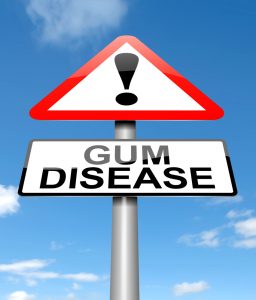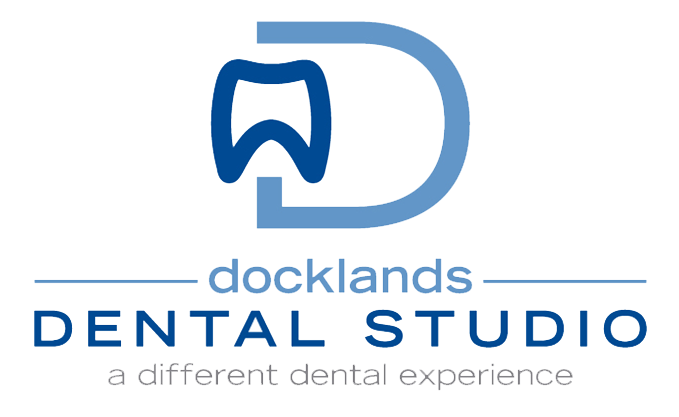
Your gums play an important role in the appearance and health of your teeth. Aesthetically, they are designed to frame your teeth in such a way to make your smile appear balanced and appealing. When the gum line is uneven, it can make ordinarily straight teeth appear asymmetrical. Gums also help hold your teeth in place, as well as protect the more sensitive areas from harmful bacteria
When gums begin to recede, it not only affects the overall aesthetics of your smile, but can increase your risk for oral health concerns, such as gum disease. Knowing what gum disease is, who is at risk, and the side effects to be aware of in advance can help you counteract this oral health condition and protect the longevity of your natural teeth. Our dentists at Docklands Dental Studio offer periodontal treatments for our patients who may be experiencing the beginning stages of this disorder. Contact our office today online or give us a call at 03 9021 9487 to learn more.
What is Gum Disease?
Gum disease, also known as periodontal disease, is a type of bacterial infection that causes inflammation and can severely damage the soft and hard tissues in your mouth. As the fifth leading disease in Australia, gum disease affects one in three adults. In it’s more aggressive stages, it can lead to tooth loss, jawbone degeneration, and serious health concerns. Gum disease has been linked to diabetes, heart disease, high blood pressure, stroke, and oral cancer. Because your oral health has a direct impact on your physical health, by adequately keeping your teeth and gums free of plaque and decay – you have a greater chance of maintaining a healthier smile and body.
Are You at Risk?
While it is typically caused by tooth decay as a result of plaque buildup and poor oral hygiene habits, there are multiple causes. Some of the most common causes and risk factors include:
- Your age: Over 50 percent of Australians over the age of 65 have gum disease.
- Skipping regular checkups: If exams and dental cleanings are not attended as requested biannually, plaque can continue to buildup along your gum line, resulting in gum disease. You also miss out on x-rays and examinations. Some of the early signs of gum disease are hard to detect by the average person, but a dentist will be able to catch them immediately through careful examination.
- Lifestyle habits: People who smoke, use tobacco products, or consume alcohol excessively have a higher risk of developing gum disease and oral cancer.
- Hormone fluctuations: Gum disease development is also linked to hormone fluctuations as a result of puberty, menstruation, pregnancy, and menopause, placing women at a higher risk.
- Family history: Gum disease has a genetic predisposition, so if your grandparents, parents, or siblings have been diagnosed with gum disease, it is important that you attend regular dental checkups and cleanings to help protect your smile.
- Medications: Taking certain medications may also place you at risk of gum disease. If you take antidepressants, oral contraceptives, antihistamines, antacids, or medications for high blood pressure, the side effects may affect your gum health – so it’s important to monitor your gums closely.
Six Signs You May Have Gum Disease
Because gum disease is the leading cause of tooth loss, catching gum disease early can help reverse side effects and protect the longevity of your teeth. Below are some of the more frequent signs of gum disease:
Inflamed Gums
Gum inflammation is not abnormal if you have a cavity, something caught between your teeth, or a spike in hormones as a result of menstruation, pregnancy, or menopause. However, if your gums appear red and inflamed for weeks at a time and are followed by dental sensitivity and soreness – it may be a sign of gum disease.
Bad Breath
While bad breath can occur after eating certain foods, the bad breath associated with gum disease is chronic, typically stronger than normal, and unable to be treated with traditional methods. It may also be followed by a bad taste in your mouth.
Bleeding Gums
A little bit of bleeding when flossing is normal, but if your gums bleed unexpectedly or each time you brush and floss – it may be time to visit a dentist to address the underlying issue.
Gum Recession
Gum recession can be both a cause and sign of gum disease. As pockets of infection continue to penetrate your gum line, it causes gums to lift away from the base of your tooth, revealing the more sensitive area of the tooth. If your teeth appear longer than usual, you may have receding gums. If gum recession is left unaddressed, the gum disease will begin to affect the roots of your teeth.
Loose Teeth or Dental Misalignment
When gum disease continues to affect your teeth and jawbone, it will cause tissue degeneration. This can cause teeth to begin shifting out of place or loosen from the socket. When this happens, you may experience chronic dental pain, misalignment, and tooth loss.
Reduced Dental Function
Ongoing teeth and jaw pain can greatly inhibit your dental function and make daily tasks, such as chewing and biting down difficult. If you currently wear dentures and they are painful to wear or you notice them slipping more than usual – this is not normal and may be a sign of tissue degeneration.
Treating Gum Disease
The type of gum disease treatment will depend on the severity of your side effects. When caught early on, a dentist will perform a deep cleaning that includes scaling and root planing. During this treatment, special dental instruments will be used to remove the plaque and bacteria from below the gum line, and smooth the root surface to help gums fit securely around the base of the tooth. This type of cleaning is more intensive than a traditional cleaning and may include local anesthesia beforehand to numb the gums and surrounding tissues. Once the cleaning is completed, a topical antibiotic can be used to address any further infection. You may be encouraged to attend dental cleanings more frequently to prevent side effects from reoccurring.
Think You May Have Gum Disease?
If you live in South Melbourne, Docklands Dental Studio is only five to 10 minutes away by car or taxi. Just take Montague Street towards the city and then Wurundjeri Way.
Also published on Medium.
